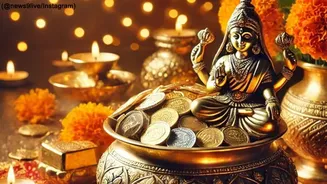Sometimes the most powerful purchases aren't driven by need - they're fueled by hope.
When my grandmother clutched that tiny silver coin on Dhanteras morning
last year, her weathered hands trembling slightly, she wasn't just making a transaction. She was performing an ancient ritual of optimism, one that millions of Indians will repeat today without fully understanding why their hearts race a little faster in those precious muhurat hours between 6:44 PM and 7:42 PM.

(@gettyimages/Instagram)
The Science Behind Sacred Shopping
Here's what's fascinating: behavioral economists have discovered that festival shopping triggers the same neurological pathways as gambling. The anticipation. The ritual. The belief that this purchase - this exact moment - will somehow alter destiny's trajectory.

(@sorted.digital/Instagram)
Dr. Archana Gupta's recent research reveals that 60% of urban Indians report feeling "highly excited" about festival shopping . But it's not the products driving this euphoria. It's the psychology of possibility - the intoxicating belief that buying gold during Dhanteras multiplies wealth thirteen-fold .Think about it. We're essentially purchasing hope in metallic form.
Cultural Conditioning Meets Consumer Psychology
The Dhanteras phenomenon perfectly illustrates how deeply cultural programming influences economic behavior . When you examine the numbers - India sees 10-12% of its annual gold sales concentrated into this single day - you realize you're witnessing something far more profound than mere shopping.

(@sorted.digital/Instagram)
This isn't just about Goddess Lakshmi or Lord Dhanvantari emerging from mythical ocean-churning ceremonies. It's about psychological anchoring. The human brain, desperate for control in an uncertain world, latches onto traditions that promise predictable outcomes.
Research from multiple universities shows that people experience measurable anxiety reduction when performing "luck-enhancing" rituals . That brass utensil isn't just cookware - it's bottled confidence.
The Emotional Economics of Auspicious Timing

(@Grok)
Consider this: 74% of Indians still prefer celebrating festivals traditionally rather than adopting modern approaches. Why? Because tradition offers something that contemporary consumer culture cannot - meaning beyond materialism.

(@gettyimages/Instagram)
Indians shopping on the occasion of Dhanteras
When families gather in those crowded jewelry shops, debating between gold coins and silver idols, they're not just making financial decisions - they're participating in collective therapy, reinforcing social bonds through shared purchasing rituals.The psychology gets even more interesting when you examine regional variations. Eastern zone consumers prioritize discounts over quality, while SEC A shoppers demand both premium products and brand reputation. Yet across all demographics, the underlying motivation remains constant: the need to feel agency over an unpredictable future.
Beyond Superstition: The Rationality of Ritual
Here's where things get really fascinating - and slightly uncomfortable for rationalists like myself. Multiple studies demonstrate that "superstitious" behaviors often produce measurably positive outcomes, not through magical intervention, but via psychological mechanisms. The confidence boost from carrying lucky charms actually improves performance. The anxiety relief from following traditional timing genuinely enhances decision-making clarity.

You may call it the Placebo effect : people often feel relief, luck, or protection after doing a ritual or following a belief, not because the ritual has scientific power, but because their faith in it changes how their body and mind respond.
So when someone insists on buying property during auspicious periods, they might not be as irrational as skeptics assume. The emotional satisfaction and stress reduction could actually lead to better long-term outcomes - a self-fulfilling prophecy wrapped in ancient wisdom.
The Modern Paradox
Today's Dhanteras shoppers navigate between tradition and technology, seeking blessings through Amazon Prime deliveries and digital gold purchases . Yet the psychological underpinnings remain unchanged. Whether buying physical coins or investing in gold ETFs, the emotional satisfaction derives from the same source: the belief that timing matters.This creates a peculiar modern phenomenon - rational consumers making irrational purchases for emotionally satisfying reasons. And honestly? Maybe that's perfectly fine.

(@gettyimages/Instagram)
Perhaps Dhanteras reveals something profound about human nature. We're not just economic actors maximizing utility; we're meaning-seeking creatures desperate for rituals that connect us to something larger than ourselves.
When you see those crowded markets today, remember: you're witnessing not just commerce, but collective psychology in action. Every purchase carries the weight of ancestral hope, every transaction represents humanity's eternal struggle against uncertainty. That's worth more than gold itself. Happy Dhanteras!













